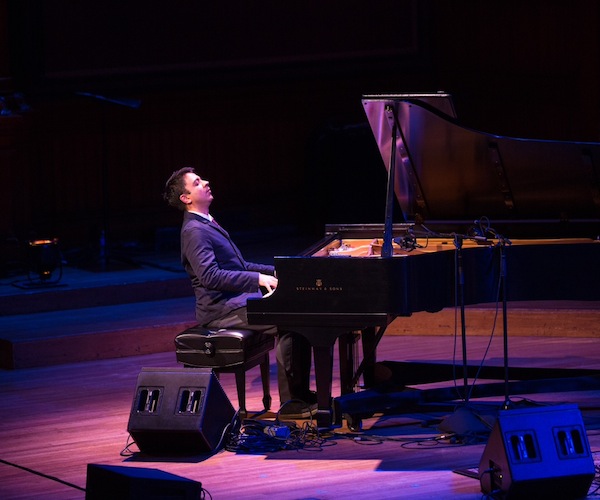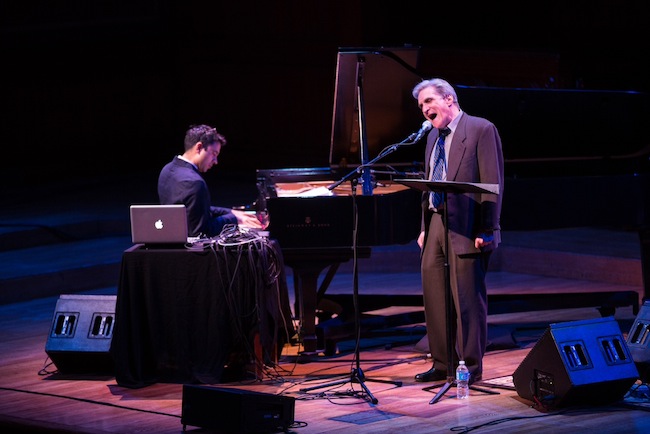Jazz Review: The Vijay Iyer Trio and Poet Robert Pinsky Create POEMJAZZ
By Michael Ullman
The first part of the evening worked: Robert Pinsky was a good enough actor, his poetry was sufficiently transparent, and Vijay Iyer proved to be a brilliant accompanist.
POEMJAZZ, Vijay Iyer Trio with special guest Robert Pinsky. Presented by the Celebrity Series of Boston at Sanders Theater, Cambridge, MA, March 15.
No one, I believe, is currently doing more to extend the range of jazz and jazz-influenced musics than pianist Vijay Iyer. His playing and composing draw on the adventurous experimentation of jazz performers such as pianist Andrew Hill and saxophonists Henry Threadgill and Julius Hemphill, but he also reinterprets Indian music, exploring its rhythmic complexities. (His recording Tirtha features guitar and tabla.) In addition, he is fascinated with electronics: several years ago, Iyer appeared at Wellesley College playing with (or against) a second grand piano, the latter programmed by trombonist George Lewis to react to Iyer’s phrases. It came off as a musical version of one of those chess competitions that pit a master against a computer.
Last Wednesday (March 13th), in the Trinity Church on New York’s Wall Street, a string quartet played some of the music from Iyer’s new disc, Mutations. At Sanders Theater in Cambridge, the pianist went in a different direction. He appeared with his trio – Stephan Crump, bass, and Marcus Gilmore, drums. In the first half of the concert, though, Iyer collaborated with the ex-poet laureate Robert Pinsky, who read poems to the accompaniment of Iyer’s piano and programmed electronics.
If there was a theme that united Pinsky’s poems, it was the imagination’s ability to make beauty out of what is flawed, to find the sublime in unlikely places. He began with a poem entitled “Horn” that was explicitly about jazz. First, Pinsky told us a story about Charlie Parker who, he said, could find value in any music, including that of a “hack journeyman hornman” he heard in passing. Later Pinsky chanted a poem about the most beautiful thing he saw in California – an oil refinery. Another poem was a celebration of lower middle class neighborhoods. For him, looking at the houses in those neighborhoods resonates with “Wordsworth looking at a lake.” As in Wordsworth’s nature poetry, though, the scene Pinsky’s poem describes was eerily devoid of people.
Iyer’s accompaniment was brilliantly nuanced. “The Refinery” began with a computer simulating the sounds of a rhythm section, including a bass line, the tapping of a drum, and a cymbal crash. Even when it embraces electronics, Iyer’s music maintains a natural flow: his compositions and improvisations tend to be presented in densely stated, discrete chunks, a succession of phrases that defy conventional swing and yet maintain a satisfactory pulse even as he shiftily changes meters. He will frequently start softly, at a whisper, and then build up to a long, finally thrilling crescendo.
Behind Pinsky’s oddly worded love poem “Antique,” Iyer played a blues whose primal harmonies became more and more recherché. Pinsky’s reading emphasized the line “I drowned in the fire of having you,” followed by an awkwardly predictable answering phrase, “I burned in the river of not having you.” Call and response is part of the jazz vocabulary, so the obsessive repetition of the poem “Take and Give” fit in well with Iyer’s playing. The musician began his accompaniment to “The Want Bone” rhapsodically, with a huge tremolo in the bass and clangorous chords in the right hand. This led to an extended dimunendo to prepare for Pinsky’s entrance. When he returned to solo, Iyer brought in a kind of folksy grandiosity. This was Iyer’s take on country music: he is able to shift moods and even genre in a flash. The first part of the evening worked: Pinsky was a good enough actor, his poetry was sufficiently transparent, and Vijay Iyer proved to be a brilliant accompanist.
In the second half, the Iyer trio triumphed in its own way. They have been together at least a decade. Bassist Stephan Crump comes from Memphis. (Perhaps he is a descendant of the famous Memphis mayor about whom W.C. Handy wrote “Mr. Crump.”) Drummer Marcus Gilmore has an equally distinguished family background: he is the grandson of master drummer Roy Haynes. The trio breathes together: Crump solos and sometimes accompanies in short bursts of notes that echo Iyer’s own phrases. Iyer’s pieces, with their sometimes near obsessive repetitions, seem to challenge the band to find variety within clearly restricted fields: all the tunes featured his clearly articulated, sharply etched phrases on piano, presenting large arcs of increasing intensity and then graceful retreats. He played his own compositions, including a new piece, “Hood,” and paid tribute to Henry Threadgill with the saxophonist’s “Little Pocket Size Demons.” (Threadgill recorded “…Demons” on Too Much Sugar for a Dime, Axiom Records, and Iyer recorded a trio version on Accelerando, Act Records.)
Iyer also indirectly gave a nod to another influence, Ellington, with a solo version of Billy Strayhorn’s “Lotus Blossom.” The set demonstrated Iyer’s virtuosic power, his rhythmic subtlety, and, on the ballads, his ability to suggest romance without overstepping into sentimentality. His Ellington tribute dissolved into a fog with heavily pedaled chords. Iyer told the audience that he doesn’t know when the trio will next appear in Boston, but he’ll be around — he just received tenure at Harvard.
Michael Ullman studied classical clarinet and was educated at Harvard, the University of Chicago, and the U. of Michigan, from which he received a PhD in English. The author or co-author of two books on jazz, he has written on jazz and classical music for The Atlantic Monthly, The New Republic, High Fidelity, Stereophile, The Boston Phoenix, The Boston Globe and other venues. His articles on Dickens, Joyce, Kipling, and others have appeared in academic journals. For over 20 years, he has written a bi-monthly jazz column for Fanfare Magazine, for which he also reviews classical music. At Tufts University, he teaches mostly modernist writers in the English Department and jazz and blues history in the Music Department. He plays piano badly.
Tagged: Robert Pinsky, The Celebrity Series of Boston, Vijay Iyer Trio


